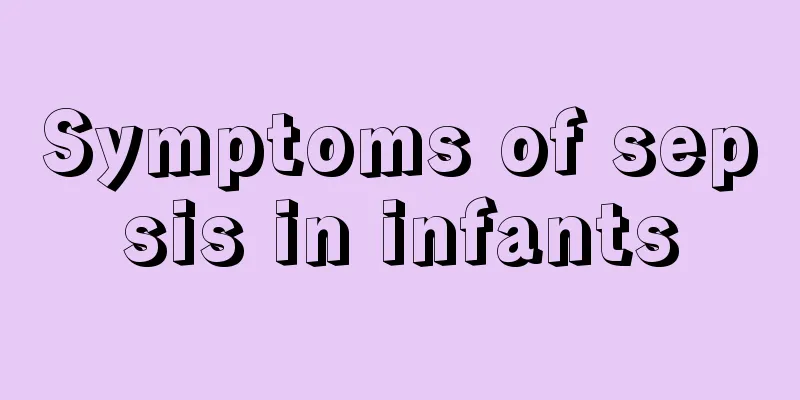Symptoms of sepsis in infants

|
Every change in the baby after birth is watched by the mother. Because many new mothers do not understand the baby's growth and development very well, sometimes their judgment of the baby's physical condition is not very accurate. From birth to adulthood, every day is very difficult for babies, and mothers worry about their babies growing up healthily. The following are some symptoms of infant sepsis that mothers should understand and seek timely treatment if symptoms occur.
Neonatal sepsis refers to a serious infectious disease that occurs in the neonatal period. It is a systemic inflammatory response caused by pathogens invading the neonatal blood and growing, multiplying, and producing toxins. Common pathogens are bacteria, but they can also be other pathogens such as fungi, viruses, or protozoa. Because the newborn's immune system is not yet mature and has poor immune function, pathogens can easily spread throughout the body and the disease progresses rapidly. At present, neonatal sepsis is an important disease in the neonatal period, with an incidence rate of 1‰-10‰ of live births. The lighter the birth weight, the higher the incidence rate, which can reach 164‰ in extremely low birth weight infants. The mortality rate is 13‰ -50‰. This disease is difficult to diagnose in the early stages and is prone to misdiagnosis. If not treated in time, it can lead to septic shock and multiple organ dysfunction syndrome (MODS).
Clinical manifestations of neonatal sepsis: 1. Reduced milk intake and weak sucking: Newborn babies consume significantly less milk, suck for a short and weak time, choke easily while feeding, and seem to not know hunger. 2. The crying sound is soft like a cat’s meow: Babies with sepsis often do not cry or cry for only a few times and then stop, and their crying sound is soft. 3. The body temperature does not rise, but the hands and feet are cold: When a newborn suffers from sepsis, the body temperature is very low, and when measured below 35.5℃, the baby's hands and feet will be cold. 4. General weakness and seldom movement of limbs: Babies with sepsis have general weakness in their limbs and body. When the upper limbs are stretched, there is no obvious flexion reaction. Once the baby's hands are released, his upper limbs will naturally fall down, and he will not hold the mother's fingers tightly, and his limbs rarely move. 5. Poor response and drowsiness: Babies with sepsis have a poor response ability when stimulated and will not respond appropriately, such as waking up, staring, smiling, etc. They will appear listless or drowsy.6. Jaundice does not subside or reappears after it subsides: Normal physiological jaundice should gradually subside. However, in neonatal sepsis, physiological jaundice does not subside but worsens, or jaundice reappears after it subsides. 7. Failure to gain weight: For newborns with sepsis, physiological weight loss will exceed the normal range, and the weight will not increase during the weight gain period. 8. Shock: Pale complexion, skin patterns, decreased blood pressure, and little or no urine. |
<<: Symptoms of high back tension in babies
>>: Bruise on baby's buttocks and back
Recommend
What should I do if my breastfed baby is calcium deficient?
What should I do if my breastfed baby is calcium ...
What is the cause of cerebral palsy in children
Under current medical conditions, there are no ob...
1 to 2 year old baby education
The education of babies between one and two years...
How to correct the symptoms of hunchback in children
If we want to correct the symptom of children'...
How many months does the child eat complementary food?
Maybe many of us don't have a clear understan...
Are sit-ups OK for kids?
It is good for people's health to do exercise...
What should I do if my newborn has a big appetite?
In fact, if the baby has a big appetite and there...
Treatment of baby's bronchitis cough with phlegm
Some babies have coughing symptoms due to colds a...
Eleven-month-old baby has acute gastroenteritis and poor appetite
We all know that when babies are young, because t...
Can children take a bath after vaccination?
Getting preventive shots is very beneficial for c...
What should I do if my child has chronic nephritis?
Although kidney disease and stomach disease are n...
What color is jaundice poop?
Jaundice is common in newborns, especially in bab...
How to give Yinzhihuang to babies
Most babies will show yellowing signs on their bo...
What is the cause of port-wine stain on children’s lips?
If a child has a bright red stain on his lips, yo...
What should I do if my child’s throat is red and swollen?
If a child suddenly develops a red and swollen th...









